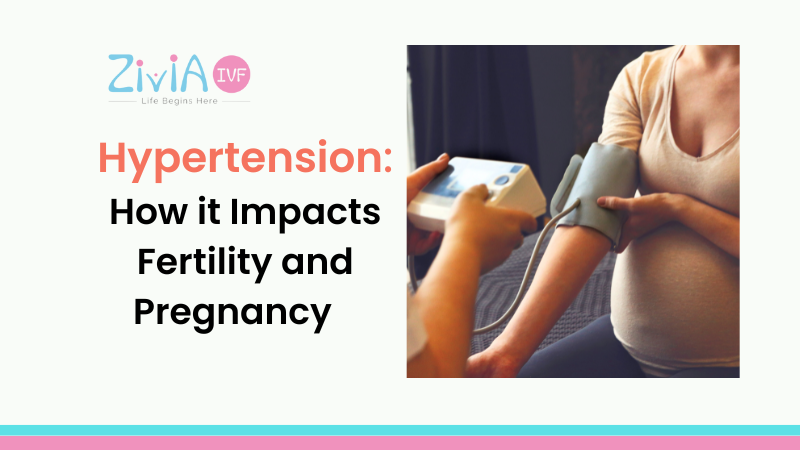
Hypertension, commonly known and referred to as high blood pressure, is now no longer just an old age problem but also affects young people.
While hypertension is a concerning health condition, it can also impact fertility, pregnancy, and overall sexual health.
Keep reading to find out how hypertension can impact fertility and pregnancy and how to deal with it.
What is Hypertension?
Hypertension, alternately called High blood pressure, is a cardiovascular problem that affects about 25-40 percent of individuals worldwide.
In this condition, the blood pumped by the heart exerts excess pressure on the artery walls, and thus it works harder to pump blood.
It is a major cardiovascular condition that can lead to multiple problems like headaches, nosebleeds, chest pain, heart attack, stroke, etc.
But that is not all. It also impacts your fertility and can cause complications during pregnancy.
Hypertension and Infertility
High blood pressure can disrupt one’s hormonal balance, affecting their reproductive health. Additionally, it can hinder blood supply to the reproductive organs in both men and women.
Hypertension and Male Infertility
Male infertility problems induced by hypertension include –
- a lower semen volume
- lower sperm mobility
- lower total sperm count
- lower mobile sperm count
- abnormal sperm structure
Hypertension and Female Infertility
Female infertility problems induced by hypertension include –
- Poor egg quality
- Irregular ovulation
- Excessive estrogen production
- Difficulty in embryo implantation
Does blood pressure medication affect fertility?
Some medications which are used to control high blood pressure can have a side effect on your fertility and reproductive health.
Research shows that anti-hypertensive medicine may affect semen. Men taking hypertension medication had a statistically lesser semen volume and sperm count than men not taking anti-hypertensive medications.
For instance, men who take beta-blockers used in certain anti-hypertensive tablets had a decreased volume and concentration of sperm compared to men not taking medications.
You can talk to our fertility expert to check this fact. Just discuss the medications you are taking and infertility issues or any other sexual health problem you are facing while trying to conceive.
Hypertension in Pregnancy
Hypertension in pregnancy is quite a prevalent medical problem. It involves between 6-8 percent of all pregnancies.
Though hypertension can affect the fertility rate, you can still get pregnant naturally or through procedures like IVF.
Hypertension in pregnancy can harm maternal health as well as the baby’s health and can cause several complications such as –
- Pre-term birth
- Placental abruption, i.e., the placenta gets separated from the uterine lining.
- Preeclampsia, i.e., problems in the kidney and liver due to hypertension
- Eclampsia
- Intrauterine growth restriction
- Other pregnancy disorders
If you suffer from hypertension or pregnancy-induced hypertension, then consult a doctor.
Different types of Hypertension in pregnancy
Pregnancy-induced hypertension begins after 20 weeks of pregnancy and ends shortly after childbirth.
There are several types of hypertension in pregnancy. The most common types are-
- Chronic Hypertension- Hypertension either before pregnancy or during the first 5 months (20 weeks) and continues after childbirth.
- Gestational Hypertension- Hypertension in the latter part of pregnancy, i.e., after 20 weeks of pregnancy. It can be caused due to obesity, age, stress, poor diet, excessive salt or caffeine intake, etc.
- Preeclampsia- Preeclampsia is hypertension found in the second half of pregnancy, typically 27 weeks of pregnancy. It can affect organs like the brain, liver, or kidney. If chronic or gestational hypertension is worsened, it can lead to preeclampsia.
Dealing with Hypertension in Pregnancy
Many medical conditions and lifestyle choices can contribute to high blood pressure.
Below is a list of possible lifestyle adjustments which can help deal with hypertension in pregnancy or if you are trying to conceive-
- Healthy Diet- Increase intake of whole grains, high-fiber foods, and low-fat dairy products.
- Decrease Salt Intake- High salt intake can contribute to hypertension. Try limiting your salt intake to 1 teaspoon a day.
- Exercise- Include 150 minutes of moderate or 75 minutes of high-intensity exercise weekly.
- Avoid alcohol- Avoid alcohol intake, and don’t smoke if you have high blood pressure.
- Manage stress- Yoga and meditation can help lower your stress level. They are effective tools that can help cope with hypertension in pregnancy.
How can Zivia IVF help?
Successful pregnancy with hypertension is possible with timely care. Zivia IVF is among India’s top fertility centers, which through its high-tech technology and expert team of doctors, can help you deal with infertility and pregnancy problems due to high blood pressure.
So, what are you waiting for? Don’t let high blood pressure be a roadblock in your parenthood journey.
Book your appointment today.
